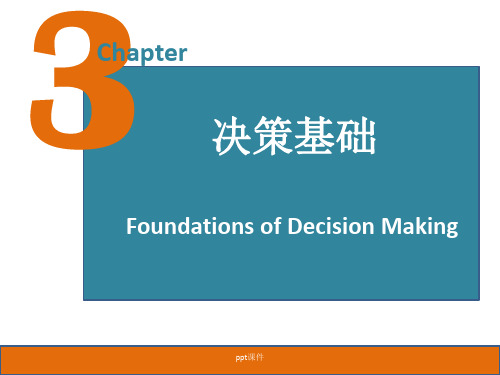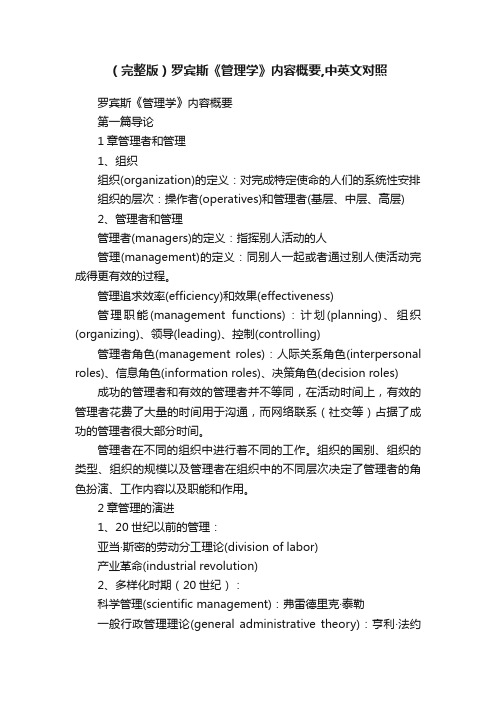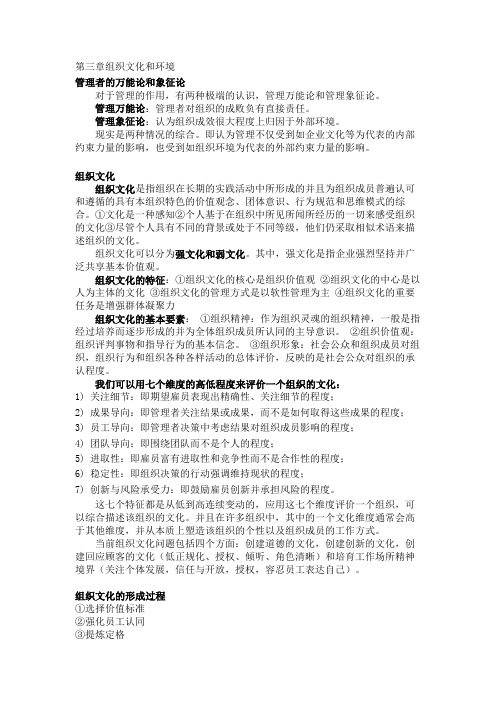罗宾斯管理学第3章(中文版)
- 格式:pptx
- 大小:1.86 MB
- 文档页数:15



(完整版)罗宾斯《管理学》内容概要,中英文对照罗宾斯《管理学》内容概要第一篇导论1章管理者和管理1、组织组织(organization)的定义:对完成特定使命的人们的系统性安排组织的层次:操作者(operatives)和管理者(基层、中层、高层)2、管理者和管理管理者(managers)的定义:指挥别人活动的人管理(management)的定义:同别人一起或者通过别人使活动完成得更有效的过程。
管理追求效率(efficiency)和效果(effectiveness)管理职能(management functions):计划(planning)、组织(organizing)、领导(leading)、控制(controlling)管理者角色(management roles):人际关系角色(interpersonal roles)、信息角色(information roles)、决策角色(decision roles) 成功的管理者和有效的管理者并不等同,在活动时间上,有效的管理者花费了大量的时间用于沟通,而网络联系(社交等)占据了成功的管理者很大部分时间。
管理者在不同的组织中进行着不同的工作。
组织的国别、组织的类型、组织的规模以及管理者在组织中的不同层次决定了管理者的角色扮演、工作内容以及职能和作用。
2章管理的演进1、20世纪以前的管理:亚当·斯密的劳动分工理论(division of labor)产业革命(industrial revolution)2、多样化时期(20世纪):科学管理(scientific management):弗雷德里克·泰勒一般行政管理理论(general administrative theory):亨利·法约尔(principles of management)、马克斯·韦伯(bureaucracy) 人力资源方法(human resources approach):权威的接受观点(acceptance view of authority),霍桑研究,人际关系运动(卡内基、马斯洛),行为科学理论家(behavioral science theorists) 定量方法(quantitative approach)3、近年来的趋势(20世纪后期):趋向一体化过程方法(process approach)系统方法(systems approach):封闭系统和开放系统(closed systems)权变方法(contingency approach):一般性的权变变量包括组织规模、任务技术的例常性、环境的不确定性、个人差异4、当前的趋势和问题(21世纪):变化中的管理实践全球化(globalization)工作人员多样化(work force diversity)道德(morality)激励创新(innovations)和变革(changes)全面质量管理(total quality management, TQM):由顾客需要和期望驱动的管理哲学授权(delegation)工作人员的两极化(bi-modal work force)3章组织文化与环境:管理的约束力量1、组织组织文化(organizational culture)被用来指共有的价值体系。



第三章组织文化和环境管理者的万能论和象征论对于管理的作用,有两种极端的认识,管理万能论和管理象征论。
管理万能论:管理者对组织的成败负有直接责任。
管理象征论:认为组织成效很大程度上归因于外部环境。
现实是两种情况的综合。
即认为管理不仅受到如企业文化等为代表的内部约束力量的影响,也受到如组织环境为代表的外部约束力量的影响。
组织文化组织文化是指组织在长期的实践活动中所形成的并且为组织成员普遍认可和遵循的具有本组织特色的价值观念、团体意识、行为规范和思维模式的综合。
①文化是一种感知②个人基于在组织中所见所闻所经历的一切来感受组织的文化③尽管个人具有不同的背景或处于不同等级,他们仍采取相似术语来描述组织的文化。
组织文化可以分为强文化和弱文化。
其中,强文化是指企业强烈坚持并广泛共享基本价值观。
组织文化的特征:①组织文化的核心是组织价值观②组织文化的中心是以人为主体的文化③组织文化的管理方式是以软性管理为主④组织文化的重要任务是增强群体凝聚力组织文化的基本要素:①组织精神:作为组织灵魂的组织精神,一般是指经过培养而逐步形成的并为全体组织成员所认同的主导意识。
②组织价值观:组织评判事物和指导行为的基本信念。
③组织形象:社会公众和组织成员对组织,组织行为和组织各种各样活动的总体评价,反映的是社会公众对组织的承认程度。
我们可以用七个维度的高低程度来评价一个组织的文化:1) 关注细节:即期望雇员表现出精确性、关注细节的程度;2) 成果导向:即管理者关注结果或成果,而不是如何取得这些成果的程度;3) 员工导向:即管理者决策中考虑结果对组织成员影响的程度;4) 团队导向:即围绕团队而不是个人的程度;5) 进取性:即雇员富有进取性和竞争性而不是合作性的程度;6) 稳定性:即组织决策的行动强调维持现状的程度;7) 创新与风险承受力:即鼓励雇员创新并承担风险的程度。
这七个特征都是从低到高连续变动的,应用这七个维度评价一个组织,可以综合描述该组织的文化。
管理学罗宾斯11版中英文对照详解第一篇:管理学罗宾斯11版中英文对照详解第一部分• Efficiency效率P8 –“Doing things right”–Getting the most output for the least inputs • Effectiveness 效果–“Doing the right things” – Attaining organizational goals The Manager: P44 Omnipotent or Symbolic? • Omnipotent View of Management管理万能论viewing the world solely through your own perspectives, leading to an inability to recognize differences between people.• Ethnocentric Attitude民族中心论the view that the managers in the host country know the best work approaches and practices for running their business.东道国取向• Geocentric Attitude全球中心论–aworld-oriented view that focuses on using the best approaches and people from around the globe.全球取向• Mu ltinational Corporation(MNC)跨国公司an obstacle(障碍)that makes it difficult to achieve a desired goal or purpose.• Why Do Managers Plan?为什么管理者要制定计划• Purposes of Planning计划的目的– Provides direction给出方向– Reduces uncertainty降低不确定性– Minimizes waste and redundancy减少重复和浪费– Sets the standards for controlling便于控制Mission:使命P227 a statement of the purpose of an organization对组织目的的声明• 范围• Organizational Designthe transfer and understanding ofmeaning.意义的传递和理解• Transfer means the message was received in a form that ca n be interpreted by the receiver.• Understanding the message is not the same as the receiver agreeing with the message.• Interpersonal Communication人际沟通-communication between two or more people.主要指存在于两人或多人之间的沟通;• Organizational Communication组织沟通-all the patterns, networks, and systems ofcommunications within an organization.主要指组织中沟通的各种方式、网络Work specialization工作专门化Departmentalization部门化Chain of command指挥链Span of control管理跨度Centralization and decentralization集权与分权 Formalization 正规化和系统。
第一部分•Efficiency效率P8–“Doing things right”–Getting the most output for the least inputs •Effectiveness效果–“Doing the right things”–Attaining organizational goalsThe Manager: P44Omnipotent or Symbolic?•Omnipotent View of Management管理万能论- the view that managers are directly responsible for an organization’s success or failure.认为经理直接负责组织的成功或失败•Symbolic view of Management管理象征论- the view that much of an organization’s success or failure is due to external forces outside managers’ control.认为一个组织的成功或失败大部分是由管理者控制之外的外部力量所造成的观点•What’s Your Global Perspective?全球观(全球视角)P71•Parochialism狭隘主义- viewing the world solely through your own perspectives, leading to an inability to recognize differences between people.•Ethnocentric Attitude民族中心论- the parochialistic belief that the best work approaches and practices are those of the home country.本国取向•Polycentric Attitude多国论- the view that the managers in the host country know the best work approaches and practices for running their business.东道国取向•Geocentric Attitude全球中心论–a world-oriented view that focuses on using the best approaches and people from around the globe.全球取向•Multinational Corporation (MNC)跨国公司- a broad term that refers to any and all types of international companies that maintain operations in multiple countries. 任一或所有类型的在多国维持经营的国际性公司。